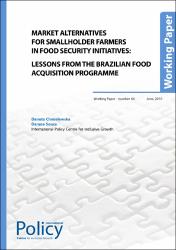Please use this identifier to cite or link to this item:
https://repositorio.ipea.gov.br/handle/11058/15491Full metadata record
| DC Field | Value | Language |
|---|---|---|
| dc.contributor.author | Chmielewska, Danuta | |
| dc.contributor.author | Souza, Darana | |
| dc.date.accessioned | 2024-10-03T23:58:21Z | - |
| dc.date.available | 2024-10-03T23:58:21Z | - |
| dc.date.issued | 2010 | |
| dc.identifier.uri | https://repositorio.ipea.gov.br/handle/11058/15491 | - |
| dc.description.abstract | Policies that support the livelihoods of smallholder farmers are crucial in efforts to tackle poverty and hunger, especially when they are designed to combine different sectors of public intervention. Small farmers account for a significant share of developing countries’ rural poor, who in turn account for 75 per cent of the total poor population in those countries (World Bank, 2008). Smallholdings are typically operated by the poor, who make substantial use of labour from their own households and from their equally poor or even poorer neighbours. Moreover, much of their income is usually spent on locally produced goods and services, thereby stimulating the rural off-farm economy and creating additional jobs (Hazell et al., 2007). They are also vital for food production and can play a significant role in increasing the availability of and access to food (United Nations, 2008). Small farmers use several different strategies to secure their livelihoods, with a view to ensuring that their food requirements are met and that they generate enough income for their immediate consumption needs, social purposes and investments. Interaction with agricultural markets is an essential part of these strategies. Markets are where, as producers, smallholders buy their agricultural inputs and sell their products; they are where, as consumers, smallholders use income from the sale of crops or from their non-agricultural activities to buy food and other consumption goods. Improved market access, therefore, is not only important for better-off producers or for the production of cash crops rather than food crops; it is also very important for smallholder farmers (IFAD, 2003). (…) | en |
| dc.language.iso | en | |
| dc.title | Market Alternatives for Smallholder Farmers in Food Security Initiatives: Lessons from the Brazilian Food Acquisition Programme | en |
| dc.type | Working Paper | |
| dc.rights.holder | International Policy Centre for Inclusive Growth | |
| dc.rights.holder | United Nations Development Programme | |
| dc.location.country | Brasil | |
| dc.description.physical | 24 p. : il. | |
| dc.rights.type | Licença total exclusiva | |
| dc.rights.license | O texto e dados desta publicação podem ser reproduzidos desde que as fontes sejam citadas. Reproduções com fins comerciais são proibidas. | |
| dc.subject.keyword | Food Security | |
| dc.subject.keyword | Smallholders | |
| dc.subject.keyword | Farmers | |
| ipea.access.type | Acesso Aberto | |
| ipea.researchfields | N/A | |
| ipea.classification | Agricultura, Pecuária e Pesca | |
| ipea.classification | Alimentação e Nutrição | |
| ipea.classification | Desenvolvimento Social | |
| Appears in Collections: | Publicações do IPC-IG | |
Files in This Item:
| File | Description | Size | Format | |
|---|---|---|---|---|
| en_IPCWorkingPaper64.pdf | 372.01 kB | Adobe PDF |  View/Open |
Items in DSpace are protected by copyright, with all rights reserved, unless otherwise indicated.

